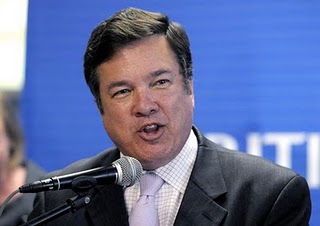McClintock: Public Utility Commission in the works for P.R.

 |
| Secretary of State Kenneth McClintock (Credit: © Mauricio Pascual) |
The State Department is getting technical assistance from the U.S. Department of Energy to establish a Public Utility Commission in Puerto Rico that would merge the Public Service Commission and the Telecommunications Regulatory Board. The new entity would also regulate the Puerto Rico Electric Power Authority and the Puerto Rico Aqueduct and Sewer Authority, Secretary of State Kenneth McClintock told News is my Business.
The ambitious plan to create a local PUC is in line with the recommendations included in the “Report by the President’s Task Force on Puerto Rico’s Status” released last month, which suggested an overhaul of the island’s energy economy through the creation of new agencies with the expertise to handle such a job.
The plan is taking shape under Reorganization Plan #11 that could be approved later this year. Including telecommunications and public transportation under the same roof would help streamline and simplify policy-making procedures, he said.
“The reorganization plan that we’re preparing to merge the PSC and the TRB calls for creating a joint entity that would have an executive president and three boards of three members each to oversee transportation, telecommunications and utilities,” said the island’s second-in-command.
If accomplished, the new PUC would again combine services that were split when the Telecom Reform Act passed in 1996 created the TRB. Prior to that, the PSC and the Consumer Affairs Department handled — on a limited basis — Puerto Rico’s telecom-related issues when Puerto Rico Telephone was still a public utility.
Now, the PSC is in charge of public transportation (taxis, trucks and van services), the propane and natural gas industry, and certain types of licensing. The TRB, meanwhile, is responsible for regulating and overseeing the island’s wireless and fixed telephone and satellite television industries.
The merger, McClintock said, would not imply job losses, as the reorganization will not create overlaps.
“It’s actually going to be a very good mix because the TRB has certain administrative strengths, where the PSC is weak and vice versa,” he said.
Delicate union
 |
| Both PREPA and PRASA have boards of their own. (Credit: © Mauricio Pascual) |
Perhaps the change that will result most difficult to tackle is shifting the decision-making powers of the water and power utilities to the new agency, as each of the mammoth agencies have governing boards of their own responsible for steering them and making revenue-generating decisions. PREPA and PRASA’s unions will undoubtedly also have their opinions on the proposed changes.
However, McClintock said that the transformation at the agencies will happen in phases, with consumer service issues migrating first. Regulatory and tariff matters will be addressed during a second phase to be implemented sometime in 2013.
“We have to hold off on that due to the fact that neither the PSC nor the TRB have dealt with those types of issues in the past, so we need to develop an education process so they can implement and manage regulations similar to how it is done for stateside water and power companies,” McClintock said.
Furthermore, he said the reorganization plan would include a clause to guarantee that rates will always shore up enough to cover each of the agency’s debt service.











